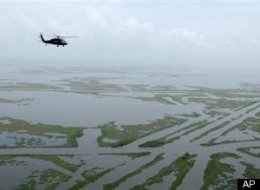Chris Kirkham
Huffington Post
Last summer’s Deepwater Horizon disaster in the Gulf of Mexico — the largest offshore oil spill in recorded history — made the Gulf Coast states the poster children for the enormous environmental risks posed by energy production near their shores.
But while the BP spill was conspicuous, an even more profound wave of environmental destruction has been steadily battering the Gulf Coast with little public scrutiny for most of a century: Continuous oil and gas development has contributed to the disintegration of nearly 2,000 square miles of Louisiana’s coastline — an area larger than the state of Delaware — making New Orleans far more vulnerable to the flooding inflicted by hurricanes that regularly roll in off the Gulf.
Pipelines and navigation channels meant to ferry oil and natural gas from the vast reservoirs beneath the Gulf have chiseled away at the natural landscape of Louisiana, degrading coastal forests, swamps and marshlands. Many scientists believe the weakening of this formerly protective layer of land enabled Hurricane Katrina to lay waste to key areas of the city.
“These are long term problems that make the effects of the oil spill, even in the worst-feared case, pale by comparison,” said Donald Boesch, the president of the University of Maryland Center for Environmental Sciences who has studied coastal Louisiana and the Gulf for more than 30 years.
Yet despite the damage the oil and gas industry has imposed on Louisiana, the state has received only a minute fraction of the billions of dollars in royalties doled out by oil companies over the years in exchange for leasing the Gulf from the federal government. Instead, most of that money has landed in the coffers of the U.S. Treasury by dint of a decades-old disagreement over who controls the bounty of the sea — the states, or the federal government?
Huge stakes hang in the balance: Offshore oil and gas revenues, primarily from the Gulf, have contributed more than $150 billion to the federal government’s coffers since the 1950s, the second largest source of revenue behind taxes.
To be sure, Louisiana has seen significant economic benefits from the presence of the oil and gas industry — not least, approximately 15 percent of household earnings, according to the state, and tax revenues and fees that contributed about 14 percent of the state’s general fund. But state leaders argue that a lack of direct compensation via a slice of offshore energy royalties has left them with inadequate funds to restore lands that have been harmed through oil and gas extraction.



Be the first to comment on "On Louisiana Coast, Damage From Oil Goes Much Deeper Than Spill"